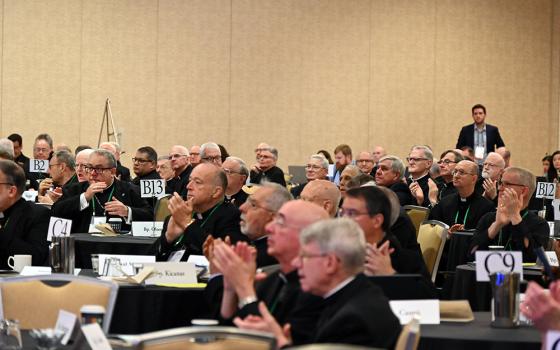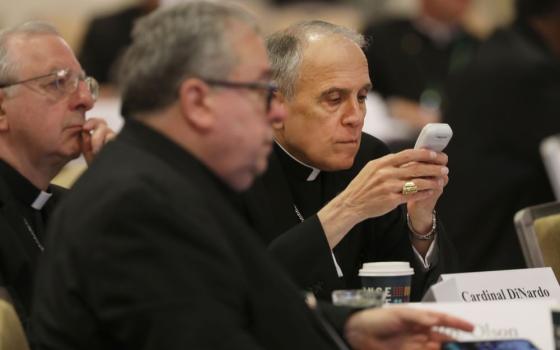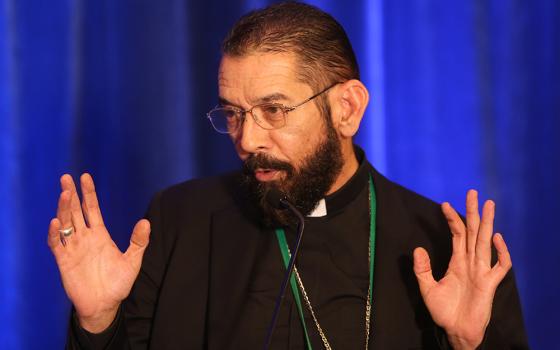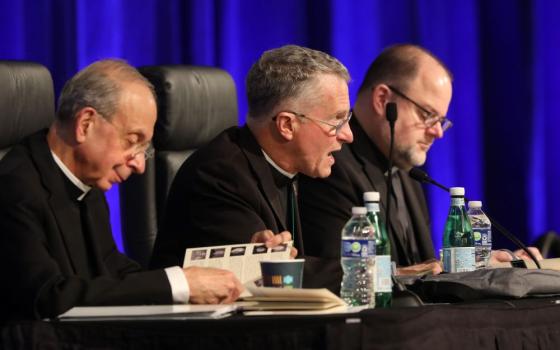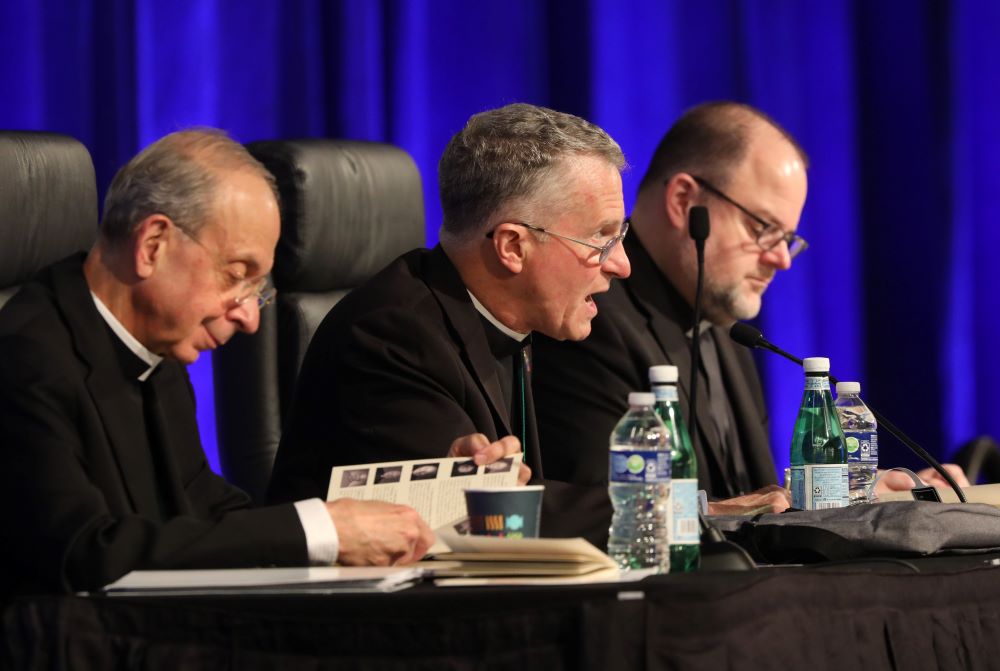
Archbishop Timothy P. Broglio (center) of the U.S. Archdiocese for the Military Services, who is president of the U.S. Conference of Catholic Bishops, speaks June 15 during the bishops' spring plenary assembly in Orlando, Fla. Also pictured are Archbishop William E. Lori of Baltimore, USCCB vice president (left), and Fr. Michael J.K. Fuller, USCCB general secretary. (OSV News/Bob Roller)
The Vatican's ambassador to the United States delivered an impassioned defense of Pope Francis' ongoing three-year process for the Synod of Bishops at the June 15 opening of the U.S. bishops' two-day spring 2023 plenary assembly.
Archbishop Christophe Pierre's remarks during the assembly's first public session described the 2021-2024 Synod on Synodality — the Catholic Church's three-year global effort at listening and dialogue — as being "less about a program and more about a way of being church."
"Maybe we are still struggling to understand synodality," said Pierre, in what appeared to be a passing reference to some U.S. Catholic conservatives' suspicion and resistance to the synod. Pierre described Francis' efforts not as a disguised plan to change church doctrine, but rather as "a way of being church to discern the path on which the spirit of God is calling."
Pierre's emphatic explanations of synodality — a process of worldwide discussion Francis has said is what "God expects of the church of the third millennium" — was the highlight of a June 15 morning session that had originally been scheduled to include a vote on the bishops' official directives for American Catholic health care institutions.
'What old old ways need to be abandoned? And what new ways must be adopted in going forward?
—Archbishop Christophe Pierre
Archbishop Timothy Broglio of the Archdiocese for the Military Services, the bishops' conference president, said the vote will instead be held June 16. The vote before the bishops is to begin a process of revising the directives to mandate that Catholic facilities not provide gender-affirming medical treatment to transgender patients.
The revisions are expected to align the directives with a doctrinal note the bishops released in March that focused on what the prelates called the "moral limits to technological manipulation of the human body."
Brownsville, Texas, Bishop Daniel Flores, who chairs the conference's Committee on Doctrine, was expected to present the health care directives agenda item. Flores later told NCR that the agenda item was moved to June 16 because of time constraints.
During the morning session, Flores presented a lengthy update on the synodal process, which he said had enabled bishops to learn of the love that many lay Catholics have for their church. It also has shown the genuine frustration and pain that many have experienced from the institution, he said.
"We are all better for engaging and listening to it," Flores said of the pain some lay Catholics expressed.
Pierre also told the American bishops that the "synodal path," if they have followed the pope's lead, has been intended to help them discern two central questions regarding the Catholic Church in the modern world: "Where are we?" and "Where are we going?"
Said Pierre, "Have we discovered answers to these questions? Do we know what are the needs of our people? Through our encounters with others, how have we been changed? What have we discerned? What old old ways need to be abandoned? And what new ways must be adopted in going forward? Are we prepared to give our people the insights we have gained?"
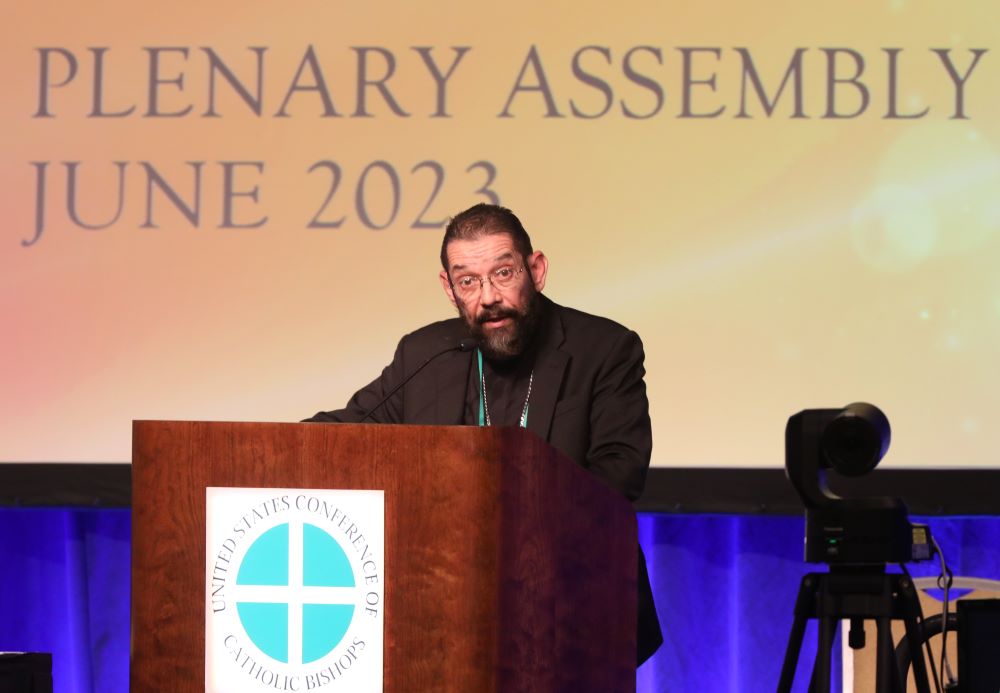
Bishop Daniel E. Flores of Brownsville, Texas, speaks June 15, 2023, during the U.S. Conference of Catholic Bishops' spring plenary assembly in Orlando, Fla. Bishop Flores is chairman of the USCCB's Committee on Doctrine. (OSV News photo/Bob Roller)
After Pierre's talk, Broglio delivered his first speech as president of the conference.
The archbishop, who was elected to a three-year term as president in November 2022, emphasized the existence of objective truth, referencing Pontius Pilate's question to Jesus — "What is truth?" — as recorded in John 18:38. "Centuries later, we are questioned by those who would question the existence of truth," said Broglio, who highlighted the church's work on behalf of migrants and refugees at the U.S.-Mexico border, and its efforts to provide assistance to people in Haiti and war-torn Ukraine.
In his speech, Broglio also referenced the controversy over the Los Angeles Dodgers honoring the Sisters of Perpetual Indulgence, a pro-LGBT group that has mocked Catholic rituals, during the baseball team's Pride Night event on June 16.
Broglio bemoaned "the disrespect for the truth and traditions of our faith, for the legendary commitment of religious women to building up society," and the "tarnishing" of what he said was once the "national sport."
Offering his prayers to Los Angeles Archbishop José Gomez, his immediate predecessor as conference president, Broglio said the Dodgers honoring the Sisters of Perpetual Indulgence "hearkens back" to the anti-Catholic Know-Nothings of the 19th and early 20th centuries.
Advertisement
Crookston, Minnesota, Bishop Andrew Cozzens presented an update on the National Eucharistic Revival, the bishops' three-year initiative to revive Mass attendance that will culminate in a four-day National Eucharistic Congress in July 2024 in Indianapolis.
"We are starting to see the fire of revival burn," said Cozzens, who described the initiative as a "bishop-led, evangelistic movement" intended to rekindle Catholics' devotion in and belief in the Eucharist as the real presence of Jesus.
The June 15 public session also included presentations on other agenda items the bishops will later vote on, including the second edition of the conference's Basic Plan for the Ongoing Formation of Priests, the National Pastoral Plan for Hispanic/Latino Ministry and various liturgical texts.
The bishops, who have a closed-door executive session scheduled for later June 15, are set to return for a second public session on the morning of June 16.
In a later press conference June 15, Flores acknowledged the resistance to the synod from some quarters in the church, though he suggested that some of those fears had abated as the process unfolded. He also said that it was important for bishops to hear those concerns.
“If synodality is going to be true to itself, then you also need to learn why people are afraid,” Flores said.
Reporters later asked Broglio for his thoughts on Republican governors in Texas, Florida and Arizona — all are Catholic — who have transported migrants to Democrat-led states including California, Illinois, New York and Massachusetts. Broglio said he suspected the governors were transporting migrants to make a political statement, which he called "problematic."
Fr. Michael Fuller, the general secretary of the bishops' conference, also read a letter from the U.S. Catholic bishops to Pope Francis in which the prelates thanked the pontiff for his witness on behalf of human dignity and the church’s moral teachings on marriage and sexuality. The bishops also said that the synodal path had been a moment of grace to the church, and added that they were looking forward to the synod’s global phase.
The bishops’ letter also noted that the state of Florida on June 15 was scheduled to execute a man convicted of killing two people in 1984. The bishops said capital punishment "is indeed a false answer that does not solve the problem for which it is invoked and introduces new elements of destruction."
Editor's Note: This story has been updated to reflect additional reporting.





